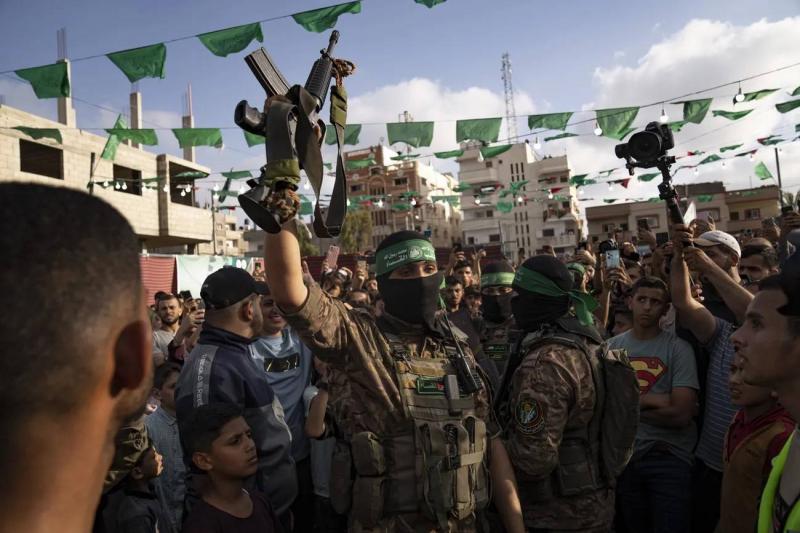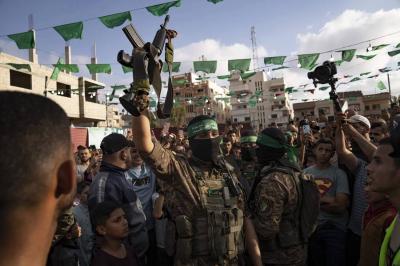The rounds of shuttle diplomacy between Fatah and Hamas continue across the capitals of the world without any significant progress, or more clearly, without any benefit for the Palestinian people. It has become a punchline that is circulated in the press regarding how the news is presented. Meanwhile, the global image regarding our issue reflects definitive views and stances from all active countries in the region. Therefore, the owners of the cause must go with the tide, not against it, because the people, land, and life as a whole in Jerusalem, the West Bank, and the Gaza Strip are suffering from a form of paralysis. To prevent this paralysis from spreading to the entire Palestinian body, the masses must be confronted with a louder voice, greater courage, and without the niceties that burden the divided cause, while posing deep questions and waiting for answers from Hamas.
It seems that any criticism directed at political Islamist movements must be preceded by a statement from the critic that they are Muslim and perform Islamic rituals, and the discussion focuses on the writer's identity rather than their ideas and questions. The writer must also affirm (in every objective critical work) that it is the right of every people under occupation to exercise all forms of resistance, including armed resistance, and that the Israeli occupation is the root of evil in the Arab region, serving as an advanced outpost for the West. Here, I reiterate for the thousandth time that armed resistance is a legitimate right for Palestinians, and this is non-negotiable. Anyone who rises to confront the occupation is a martyr.
Having discussed the emotional aspect that occupies the minds of the general populace, which influences their choices when the ballot boxes are opened, and since the situation confirms that some are captivated by diagnosis, I believe that I absolve the idea of disarming during confrontation with the enemy, while affirming the need for accountability for anyone who turns their back in flight. I feel great comfort in stating that Hamas does not fight on the ground alone, but side by side with the factions of the Palestine Liberation Organization (PLO).
Now, I will shift to the more objective and practical side that is most beneficial and relevant to the Palestinian cause. It is easy to say that there will be results from this war that seem likely to shape the region, especially Palestine. I will try to discuss a few realistic scenarios regarding the rule of Gaza, away from the influence of blood in the picture.
It is very clear that since the beginning of the war on Gaza, Hamas has remained keen not to lose control over the Gaza Strip. Here, we remember the fiery Hamas statement that referenced the authority and sowed toxic seeds to ignite civil war, a statement that threatens and warns against "those who ride on the back of the Israeli tank." Indeed, Palestinian officers, residents of the Gaza Strip and not from the West Bank, were killed for securing aid trucks traveling from southern to northern Gaza.
Similar to the first statement that condemned, Hamas issued a statement hinting at targeting any forces cooperating with the occupation (the Arab forces). Thus, we have the right to ask if Hamas remains in the destructively ruling seat like the broken Gaza Strip.
First, will Hamas allow elections in the Gaza Strip, or will it continue its longstanding ban? Second, will the occupation and the old siege continue, or will they end together? Will the occupation, the siege, or both remain, and which countries would agree to fund reconstruction under Hamas's rule in the sector?
Third, if international direction is as clear today for enabling the authority to govern Gaza, will Hamas remain silent and embrace political realism, or will it carry out armed attacks targeting elements and forces of the Palestinian National Authority, as it has threatened repeatedly, igniting a civil war that the Palestinian people cannot withstand and which they absolutely do not desire, while recalling the tragic events from its black coup in the summer of 2007?
Fourth, if Hamas's rule continues, it will be a weak and flabby governance, which is evident. The blood could reach the chins if Hamas ignites a civil war, opening the door for Palestinian tribes and families to retaliate and seek justice for crimes committed during its coup and its oppressive, undemocratic rule involving killings and mistreatment of families recognized for their patriotism, which is also plausible and cannot be overlooked. To what fragmentation will the state of the Palestinian people reach?
Fifth, if Hamas joins a national unity government, will it bring in figures marked as terrorists in many countries, some of whom are wanted by the International Criminal Court? Will the West deal with it and fund it, or will they reject it? What alternatives does Hamas have in this context?
These are five questions that some consider bold, yet they are very realistic. If anyone dares to answer them, there will be a single answer that carries within it a supreme Palestinian interest.




